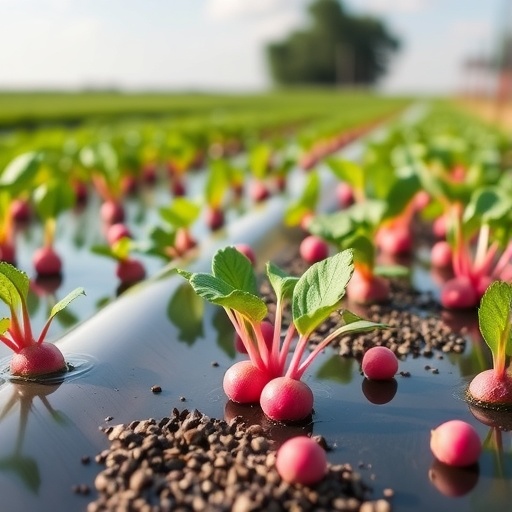The burgeoning crisis of pharmaceutical pollution in agriculture is a pressing issue that demands immediate attention. As global populations rise, the demand for food increases, leading to innovative practices such as the use of reclaimed water for irrigation. A recent study by Benelhadj-Djelloul Guetni, Nortes Tortosa, and Ponce Robles, published in Environmental Science and Pollution Research, provides a comprehensive examination of the environmental and health impacts that arise when pharmaceuticals infiltrate our food systems, specifically through radish crops irrigated with treated wastewater.
This discourse delves deeply into the implications of this phenomenon, offering both scientific analysis and urgent calls to action. The researchers meticulously catalog the types of pharmaceuticals typically found in reclaimed water, including non-steroidal anti-inflammatory drugs, antibiotics, and hormonal compounds. The presence of these substances in agricultural settings raises critical questions about their potential impact on human health, particularly as they enter the food supply through crops intended for consumption.
The methodology employed in this research is robust, involving rigorous testing and analysis to detect the concentration of pharmaceutical residues in radish crops. The researchers took a systematic approach, gathering samples from various stages of crop growth to illustrate how pharmaceuticals can accumulate in edible parts of plants. This layered method provides compelling evidence of the extent of contamination and its potential ramifications for consumer health.
One of the cornerstones of this study is its focus on the routes through which pharmaceuticals can affect human health. The ingestion of crops containing pharmaceutical residues can lead to direct exposure, which is particularly concerning. The potential for such exposure to disrupt endocrine function, contribute to antibiotic resistance, and impact overall human health is a source of great concern among medical and environmental professionals alike. This study encourages a closer evaluation of the interconnectedness between agricultural practices and public health outcomes.
The findings also highlight the risks posed to local ecosystems. Pharmaceuticals that enter soil and water systems can have deleterious effects on wildlife and plant life, leading to disruptions in biodiversity. The study emphasizes the need for integrated management approaches that account for both agricultural productivity and ecological health. As pharmaceutical contaminants persist in the environment, they can create imbalances that may threaten not only agriculture but also the foundational ecosystems that support life.
Furthermore, the authors discuss the regulatory landscape surrounding reclaimed water usage in agriculture. Current guidelines may need to be revisited given the revelations of this research. Policymakers are urged to consider the implications of treated wastewater being used for irrigation without stringent controls on pharmaceutical content. This could entail more rigorous testing protocols and stricter limits on acceptable levels of contaminants.
The research underscores the importance of consumer awareness and education. As the findings disseminate through various channels, there exists a crucial opportunity for consumers to engage with questions about the safety of their food supply. Increased awareness can lead to heightened demand for transparency in agricultural practices, encouraging producers to adopt safer methods and technologies.
Moreover, this study addresses the need for further research in the field. The complexities of pharmaceutical contamination and its multifaceted impacts require ongoing investigation to develop a comprehensive understanding of the risks involved. Subsequent studies should expand to include a more diverse range of crops, soil types, and irrigation methodologies to create a clearer picture of the broader implications of this issue.
As we look towards potential solutions, better waste management practices emerge as a focal point. Strategies such as advanced wastewater treatment technologies and more sophisticated recycling methods could mitigate the influx of pharmaceuticals into reclaimed water. By investing in these technologies, society may cultivate a more sustainable approach to irrigation, ensuring both agricultural viability and public safety.
The study culminates with a clarion call for collaborative efforts among researchers, policymakers, and agricultural stakeholders. An interdisciplinary approach will be vital as society strives to reconcile the demands of food production with the imperatives of environmental health. This collaborative spirit echoes through the report, urging that solutions emerge from partnerships that prioritize public health as much as agricultural productivity.
In closing, the research conducted by Benelhadj-Djelloul Guetni and colleagues serves as a pivotal reminder of the complex relationships between our food supply, environmental health, and public well-being. As we confront the challenges ahead, it is essential to remain vigilant and proactive, advocating for healthier, more sustainable agricultural practices that safeguard both our crops and our communities.
Subject of Research: Environmental and health impacts of pharmaceuticals in agricultural produce.
Article Title: Environmental and health impacts of pharmaceuticals in radish crops irrigated with reclaimed water.
Article References:
Benelhadj-Djelloul Guetni, L., Nortes Tortosa, P.A. & Ponce Robles, L. Environmental and health impacts of pharmaceuticals in radish crops irrigated with reclaimed water. Environ Sci Pollut Res (2025). https://doi.org/10.1007/s11356-025-36864-9
Image Credits: AI Generated
DOI: 10.1007/s11356-025-36864-9
Keywords: Pharmaceuticals, reclaimed water, radish crops, environmental impact, public health.




